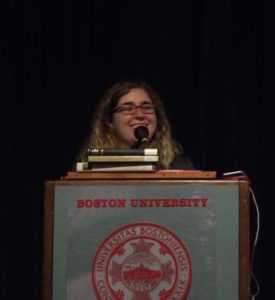By Hanna Seariac ’20
On December 1 I presented at Boston University for the Massachusetts Junior Classical League Classics Day, attended by over 850 high school students and teachers. I was there as one of a handful of college undergraduates, known as Senior Classical Leaguers. My presentation, titled “Wine and Dine in Ancient Rome,” considered the culinary and dining customs in ancient Greece and, especially, ancient Rome.
In the presentation I moved from sharing what would happen at a convivium, symposium, and every day dining to representations of food in literature, using Plautus, Horace, Juvenal, Catullus, and Plato as key examples. I discussed how certain literary features originate from ancient uses of different foods, citing, for example, Emily Gowers’ interpretation of the Atellan farce character “Maccus” as being connected to the name of a mashed cereal dish.

Furthering this point, I began to discuss my own interpretation of “false Epicureanism” in Juvenal and Horace, asserting that the idea of luxury that they each bring up in their satires by including Falernian wine and other expensive dining items parallels the attitude of real Epicureans, despite the fact that it conflicts with their own ideals.
Moving forward to Catullus’ thirteenth poem, I discussed the cena, or dinner party, as a way to advance politically, but also in a metaphorical sense. I considered how the modern film interpretation of Fitzgerald’s The Great Gatsby portrays a dinner scene between Tom and Daisy where no food is eaten. In Catullus 13, Catullus invites Fabullus over for dinner without having any food on the table. Furthermore, at the dinner scene in The Great Gatsby, Tom and Daisy spend their time “conspiring” as Tom promises to make Daisy happy. Catullus wants to spend his time “conspiring” as he promises to give Fabullus true friendship. Cena and convivium in both instances come to represent more than just a meal, but also the idea of a communion – or conspiring – over food.
My presentation was followed by a brief question and answer session, mostly focused on what I thought about the use of words such as sal as having a double meaning, “salt” and “wit.” To this I said “Well, look at our use of the word ‘salty.’”


